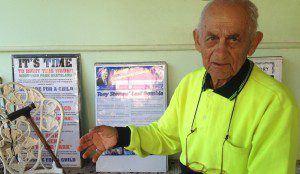
All the world’s a stage, and all the men and women merely players: they have their exits and their entrances, and one man in his time plays many parts. – As You Like It, William Shakespeare.
Tony Stevens, who will be 92 years of age later this year, has devoted two thirds of his life on a crusade for people with disability.
He has done everything humanly possible to achieve his goals, including roller skating from NSW parliament to the federal parliament in Canberra – while pushing a mate in a wheelchair.
Stevens was 87 years old at the time.
There have been protest marches across the Sydney Harbour Bridge.
Politicians have been bombarded with letters and delegations from Stevens and his supporters.
News editors who tried to resist his call for a national strategy on people with disability were driven to distraction until they gave Stevens what he wanted: publicity for his crusade.
But to the shame of the nation he has given so much, Tony Stevens has never had official recognition of his work.
This remarkable man has helped make Australia a better country but Australia has not yet found it in its heart to say thanks to him.
[social_quote duplicate=”no” align=”default”]When he appeared on the Alan Jones show on radio station 2GB, he was introduced by the great broadcaster as: “Here he is. Australian of the Year. Well, he should be. Tony Stevens.’’[/social_quote]
And Alan Jones was 100 percent right.
Not that Tony Stevens is complaining about the lack of accolades.
“I didn’t do it to win awards and plaudits,’’ he says of his 62 year crusade.
♦ It all started in 1953 when Tony Stevens’s wife gave birth to an intellectually handicapped boy named Larry.
“It was a terrible shame in those days to have a Mongoloid child, as they were called then,’’ Stevens recalls.
In 1955 his family doctor, fellow by the name Doug Everingham who became Minister for Health in the Whitlam Government, strongly advised Tony to put his child into care.
“Doug Everingham told me that I would not be able to cope, that I would end up having a nervous breakdown and I did,’’ says Stevens.
“I had so little energy I couldn’t bend down to pick up a weed.’’
Stevens’s life finally spiralled out of control and in the next few years he lost himself in two-up schools in Sydney, a popular form of gambling.
As the swinging 60s rolled around Stevens noticed that the issue of people with disability started to get some exposure in newspapers.
So when he emerged from the fog of the gambling years, Stevens put on his thinking cap.
“What I realised was that every life has a purpose,’’ Stevens recalls.
A keen roller skating champion in his younger days – they called him “king of the kids’’ at the famous Olympia skating rink – Tony Stevens conceived a plan to materially help disabled people everywhere.
He founded the Australian Roller Skating Club, a non profit organisation whose goals were to build skating rinks in every local government area.
Profits were to be used to support people with disabilities and their carers.
But Tony Stevens says the rinks served other purposes as well.
“Before the skating rinks, kids would put on their roller skates and go out on footpaths, so there would be injuries.
“The rinks provided a safe place for families to enjoy roller skating,’’ he says.
Despite increasing media attention, during the decade of the 1960s people with disability were marginalised and Tony Stevens was one of the few advocates for their rights.
“In those days most people were ashamed of the disabled,’’ he says.
“There were others here and there trying to improve the lot of the disabled.
[social_quote duplicate=”no” align=”default”]“But there just was no understanding in society at the time that every life has a purpose.[/social_quote]
“Society just tried to sweep the problem under the carpet.”
But the times, they were a’changing, as Bob Dylan had sung 10 years earlier.
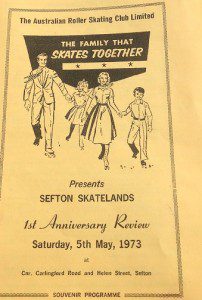 ♦ In 1973 the first rink was opened in Sefton, a suburb of Bankstown and was soon after followed by a much bigger one in Liverpool.
♦ In 1973 the first rink was opened in Sefton, a suburb of Bankstown and was soon after followed by a much bigger one in Liverpool.
The souvenir program leaflet for Sefton (pictured) is notable for not having in it a single mention of the man who was behind it: Tony Stevens.
“I wanted to be in the background, this wasn’t about me,’’ explains Stevens 42 years later.
Two years earlier he had finally come up with his plan that he firmly believed would provide a permanent solution for the disabled and their carers.
“I went looking at what other countries were doing with their disabled,’’ Stevens says now of his global search for answers.
He did a massive amount of research and a month before the It’s Time election of 1972 he published a newspaper supplement detailing his plan for the disabled people of Australia titled “Discovery – The Handicapped Children’s and Parents Adjustment Plan’’.
The key element of his 10 point plan was financial aid to the parents, to be provided via a “mentally and physically handicapped children’s bill to include a national insurance scheme’’.
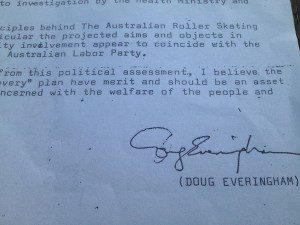 A few months later, in 1973, Doug Everingham, his old doctor from Chester Hill, now the health minister in the Whitlam Government, had experts assess the Stevens Adjustment plan for disabled people.
A few months later, in 1973, Doug Everingham, his old doctor from Chester Hill, now the health minister in the Whitlam Government, had experts assess the Stevens Adjustment plan for disabled people.
“Doug Everingham told me that that Adjustment plan had been approved and would be implemented, but in 1975 the Whitlam government was dismissed by the Governor-General before it could do so.’’
Stevens has a letter to that effect dated March 1973, with a note on the back where the Health Minister wrote: “To Tony Stevens, a small man with a big heart.’’
To say Tony Stevens was ahead of his time would be a huge understatement: The National Disability Insurance Scheme (NDIS) became law in 2013, more than 40 years after Tony Stevens first started talking about it.
But the truth is that Tony Stevens, who is a deep thinker, embarked on his crusade from the moment his son Larry was born back in 1953.
♦ In addition to the roller skating rinks and the Discovery plan, the crusade developed a third plank in the 1980s.
Stevens says he was so disgusted with the lies, the broken promises and the deceit from people in positions of power that he decided to record every part of his crusade in a book.
He used it to leverage action from politicians and it was finally launched in Parliament House Canberra four years ago by local MP Craig Kelly – who has a son with a disability – and Senator Mitch Fifield.
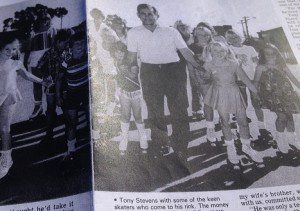
Not one to waste a media opportunity, Tony Stevens organised for every member of the Gillard Government and the press gallery to receive a copy of The Last Gamble and The Years Between.
“Tony is a long time advocate for the rights of people with disability and their carers,’’ says Craig Kelly, the Federal Member for Hughes.
“He was raising issues that are now at the forefront of the media many years ago and his efforts over decades led to the situation where we are today with the NDIS.
“Tony has put all his own resources into fighting for people with disabilities and he has never done anything for himself.
“He is a very humble man,’’ Kelly said.
Stevens’s friend and associate Roger Lovell of Young Adults Disabled Association in Liverpool (YADA) says:
“On reflection of my five decades working with him I summed up Tony with these words: A man of principle, integrity, humility, devotion, truth, dedication, care, compassion, empathy and wisdom.’’
♦ The NDIS is finally here – trials are under way right now in a number of regions and states across the country – so you’d think Tony Stevens would put his feet up and celebrate with a nice cup of tea; he’s 91 after all.
He does confess that a lot of goals have finally been realised and there’s a good future for disabled and their carers.
“My work is done,’’ he says.
But is it? Can Tony Stevens, despite failing health, completely walk away from this epic crusade?
The short answer is “no’’.
“Next week I have meetings with the Carers Alliance to work out an election strategy,’’ Stevens says when I ask him what’s next on the agenda.
[social_quote duplicate=”no” align=”default”]“This is very important, to have people in parliament representing the rights of those with disability,’’ Stevens explains.[/social_quote]
“When you consider all the people born with disability and those who become disabled later in life through accidents or whatever, you realise what a big problem this is.’’
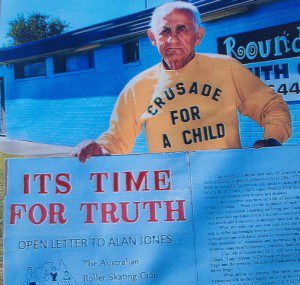
♦ The crusade to “right the wrongs’’ for people with disability has been the only constant in Tony Stevens’s life for more than 60 years.
Once he experienced the pain of having his own disabled child, Tony Stevens says he came to the understanding that he would devote his life to making life better for the disabled.
“I suddenly realised that in the face of this challenge money didn’t mean a thing.
“All the money in the world wouldn’t fix my problem with my son.’’
Stevens says he has come across evil men, but he has met a lot more good people during his journey through life.
“I have had so many good people help me, I don’t want to go to my grave thinking I’ve let them down.
“That’s why I will do this until the day I die.’’

Tony Stevens passed away a few days ago, aged 94.
Hi,
I knew Mr Stevens a very long time ago and he gave me a manuscript of an unpublished book which I still have all these years later.
It’s sad to hear that he has passed.
I wanted to know if any family members were still alive so I can send the manuscript to.
I lost contact with him and knew he wanted this book to be published.
Linda, we never came across any family members of Tony Stevens, sorry.